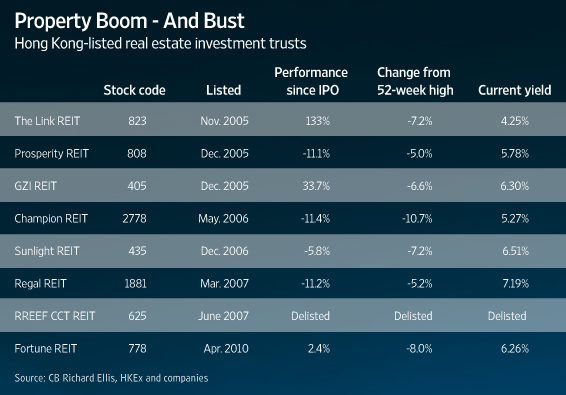HONG KONG (Dow Jones Investment Banker) – Last weekend’s simulated trading exercise for yuan securities in Hong Kong, coordinated by the stock exchange, was always a clear signal that the long- awaited launch of the first real estate investment trust to be traded in China’s currency would soon follow. True to form, investor education may be about to kick off for the deal. What has emerged so far shows a few innovations in the offer structure, as well as potentially aggressive pricing.
The REIT is called Hui Xian, a Mandarin, rather than a Cantonese, name that means “gathering of nobles” or “gathering of the virtuous.”
The flotation will take the form of a secondary offering of 2.7 billion units. The proposed free float, at around 40%, is higher than the customary 25% for IPOs, although in percentage terms remains conservative for a REIT. This is said provisionally to value the trust around CNY30 billion-plus (US$4.5 billion). That would equate to a larger-than-expected IPO – perhaps reaching US$1.8 billion. Of course, it is still subject to regulator and stock exchange approval, and to investor feedback gathered through pre- marketing. After the indicative price range is set, bookbuilding could start as soon as the latter part of next week, in which case the listing could come before Easter.
The IPO is led by Bank of China International, China’s CITIC Securities Co. Ltd. (which is itself putting the final touches to its tie-up with CLSA) and HSBC.
If initial reports are to be believed, the offer will be split 80/20 in favor of institutions, rather than the usual 90/10, in a bid to secure as much retail demand as possible. That is not surprising, since the aim of offering yuan-denominated securities is to tap the US$56.4 billion currently held in yuan deposits in Hong Kong. The favor shown to smaller investors is perhaps also a reflection of the current low, daily cap for foreign exchange transactions into yuan. As is usual in Hong Kong, the institutional/retail split may be adjusted through claw-back triggers, subject to demand placed by the public in the IPO.
No cornerstone investors have yet been announced, although the pool of likely candidates will be limited because the IPO is priced and traded in yuan. This would be new territory for some of the usual sovereign wealth funds – in the Middle East in particular – and a number of Chinese institutions have charter restrictions that restrict their investments in IPOs in Hong Kong.
As had been speculated, the REIT’s assets will include the prestigious 800,000-square-meter Oriental Plaza complex on Chang’an Avenue in Beijing, initially developed by the family of former Hong Kong Chief Executive C.H. Tung. That includes eight Grade A office blocks, serviced apartments, as well as 120,000 square meters of shopping malls, and the Grand Hyatt hotel. The development is owned by Cheung Kong Holdings Ltd. and Hutchison Whampoa Ltd., 33.4% and 18%, respectively.
Current price talk for the REIT has been of a 2011 yield in a range of about 3.70% to 4.05%, which compares to 2.58% for the 10-year benchmark government bond in Hong Kong – a spread of up to almost 150 basis points – and which, at the higher end, is roughly on par with China’s own risk-free rate. This, however, still represents a significant premium to other Hong Kong-listed REITs, which, despite a compression in their weighted average distribution yield – by 136 basis points in the second half of 2010, according to CB Richard Ellis, Inc. – have generally proved a difficult sell in Hong Kong, in sharp contrast to Singapore.

According to data from FTSE EPRA/Nareit Developed REIT Index, the eight REITs listed in Hong Kong accounted for only 8% of the global REIT market capitalization as of Oct. 29, 2010, compared with 14% for the 24 Singapore REITs.
(Click HERE for our previous story comparing the Hong Kong and Singapore REIT markets).
Market participants are said to be generally bullish about prospects for the deal. However, given that Temasek Holdings’ Mapletree Commercial Trust has just postponed its S$1 billion IPO on the Singapore Stock Exchange, primary equity market conditions are becoming more volatile and the uncertainties surrounding aftermarket liquidity for what is an as yet untested type of security in Hong Kong, Hui Xian REIT may well ultimately need to be priced to sell.
(Philippe Espinasse worked as an investment banker in the U.S., Europe and Asia for more than 19 years and now writes and works as an independent consultant in Hong Kong. Visit his website at https://www.ipo-book.com. Readers should be aware that Philippe may own securities related to companies he writes about, may act as a consultant to companies he mentions and may know individuals cited in his articles. To comment on this column, please email [email protected]).
[This article was originally published on Dow Jones Investment Banker on 23 March 2011 and is reproduced with permission]
Copyright (c) 2011, Dow Jones & Company, Inc.
